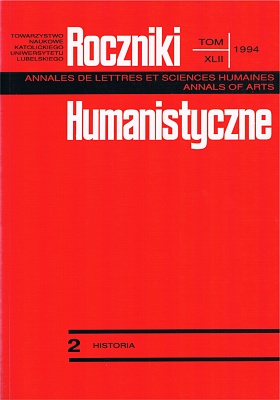Religia w projektach urządzania szkół średnich Komisji Edukacji Narodowej
Abstrakt
The paper takes up the question of the conception of religious instruction in secondary schools and its place in the educational system of the Committee in the light of the projects designed by A. Popławski, A. Kamieński, F. Bieliński, I. Potocki and J.A. Borrelli. It is A. Popławski who devoted much of his project to religion and religious education. Hence we have concentrated mainly on this source.
All project-makers assumed religion as the basis of education. In view of the projects the instruction of the Christian doctrine in junior classes was supposed to be conducted at school. However, starting from the fourth form (called geometry) onward schoolchildren were supposed to listen to moral sermons preached in the church. The authors of the projects attributed much importance to an active religious life, and postulated that religious practices and sacramental life should be grounded on authenticity and full harmony between faith and man's activity. A.Popławski, similar to other authors, being under the influence of the idea of Enlightenment thought that the process of education might be properly carried out if it was in accord with the order of natural law based on the divine origin and when it was adjusted to the psychic life of a child. In the educational process based on moral, physical and rational education Christian education was supposed to be a unifying element of the whole of educational process. Such a process was supposed to form in a pupil a good man, citizen and Christian. The project-makers based educational dealings on the moral and Christian doctrines. They have different foundations, yet are based on the natural and supernatural reality and remain in a mutual ancillary relation, while preserving full autonomy. A. Popławski, A. Kamieński and other project-makers lay great stress on the defense of the Revealed faith, and on the basic truths of the Catholic doctrine. The defense which they undertook was supposed to do away with the attacks launched by the representatives of deism, atheism and was against disbelief, so fashionable at that time. In order to carry out their defense the project-makers took advantage of Thomism, drawing on the representatives of modern philosophy. They referred to the spirit of the bills laid by St. Konarski and Collegium Nobilium.
The project-makers to a large extent based themselves on the achievements and experiences of the then teaching orders. Their projects make for an answer to the question about the kind of vision of education which dominated in the period in question among the elites of the Polish society, and at the same time serve for an explanation of their expectations in this matter.
Copyright (c) 1994 Roczniki Humanistyczne

Utwór dostępny jest na licencji Creative Commons Uznanie autorstwa – Użycie niekomercyjne – Bez utworów zależnych 4.0 Międzynarodowe.





